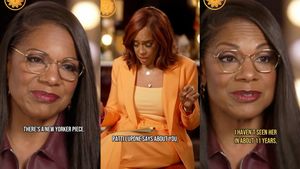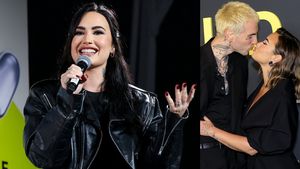Republican
presidential contender Mike Huckabee's recent refrain about
believing in miracles makes the ordained Baptist minister
appear almost prophetic.
Christian
evangelicals in Virginia who favored him in droves seemed to
send the would-be Republican presidential nominee John
McCain a message from on high -- they won't roll over
so easily.
Although the
Arizona senator has effectively sealed the Republican
nomination, Huckabee and his faith-focused followers waged a
fierce fight to overtake McCain in what should have
been a stronghold for the former Vietnam prisoner of
war, given the state's long military tradition and
Virginia senator John Warner's backing.
In the end McCain
captured Virginia -- and its 60 delegates -- but the
primary was surprisingly hard-fought and underscored just
how much work he still has to do to get a critical
portion of the Republican Party base on board before
the general election.
''McCain will be
our nominee and he is starting to consolidate the
conservative base, but as long as Huckabee stays in the race
... there will always be holdouts who find it easier
to vote for Huckabee than to unify behind McCain,''
said Todd Harris, a Republican strategist and former
adviser to actor-politician Fred Thompson, who quit the
presidential race last month. ''The best thing for our party
would be to start the healing process now and unite
behind McCain, but Huckabee's campaign is standing in
the way of that.''
So too, it seems,
are religious conservatives.
Virginia exit
polls showed that white born-again and evangelical
Christian voters lined up strongly behind Huckabee and were
unwilling to leave him even though McCain has an all
but insurmountable lead in the delegate race.
''I didn't major
in math. I majored in miracles, and I still believe in
them,'' Huckabee, the Arkansas politician-preacher and
darling of the religious right, told a cheering crowd
at the Conservative Political Action Conference last
weekend. His comments came after a key endorsement,
the backing of Focus on the Family founder James Dobson. an
evangelical leader.
Clearly,
Huckabee's flock listened -- and pushed to give him one such
miracle.
Twice as many
white born-again and evangelical Christian voters
participated in this year's Virginia Republican primary
compared with eight years ago in the last contested
Republican presidential primary. On Tuesda, four in 10
Republican voters claimed that label, compared with
just two in 10 in 2000, who called themselves members of the
religious right.
Of those voters
Tuesday, six in 10 were Huckabee voters while only a
quarter were behind McCain, according to surveys conducted
for the Associated Press and television networks.
White born-again
and evangelical Christian voters have made up Huckabee's
core of support all year. He has been getting about four in
10 of their votes in states that held competitive
Republican primaries before Virginia while McCain has
been getting support from three in 10.
With the
candidate field thinned considerably, Huckabee's margin
among the group in Virginia -- 63% -- was among his
biggest of the year. He got 70% of their vote in his
home state of Arkansas and 59% in Louisiana. He also
got nearly half the born-again and evangelical vote in the
Iowa caucuses; he scored his first victory there,
fueled by the love of religious conservatives.
Compared with
Virginia, Huckabee's advantage with that voting group was
more modest in Maryland. They made up three in 10 Republican
voters in that state and half supported Huckabee. In
both states, McCain carried more than six in 10 voters
who said they were not born again or evangelical
Christians.
In the
all-important delegate count, McCain has 789 delegates to
Huckabee's 241, with 1,191 needed to nominate.
McCain's deficit
among these voters is not shocking; he has a rocky
history with Christian evangelicals.
Despite his solid
anti-abortion Senate voting record, critics view him
warily for what they consider a long list of infractions
that ran afoul of their objectives like his refusal to
back a federal constitutional amendment banning gay
marriage. He says states have a right to make that
decision.
In his first
presidential run eight years ago against George W. Bush,
McCain derided their leaders, labeling some ''agents of
intolerance.'' Since then, he has sought to repair
relations, speaking, for instance, at the late Jerry
Falwell's Liberty University in Virginia in 2006.
McCain has
continued to reach out to conservatives in an effort to
unite the party since all but locking up the party nod
last week.
In a plea to
conservative activists then, McCain said, ''It is my sincere
hope that even if you believe I have occasionally erred in
my reasoning as a fellow conservative, you will still
allow that I have, in many ways important to all of
us, maintained the record of a conservative.''
At least one
high-profile evangelical leader, Gary Bauer, heard McCain --
and endorsed him.
But, as Virginia
showed, McCain's message has not yet resonated with the
masses.
He has nine
months until the November election to ensure that it does.
(Liz Sidoti, AP)


















































































